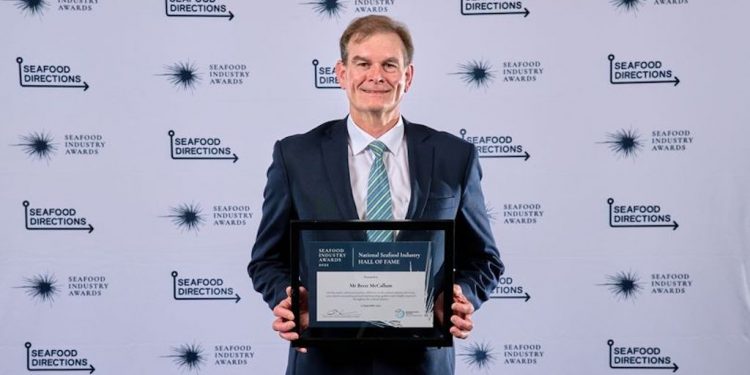Brett McCallum has been inducted into Australia’s Seafood Industry Hall of Fame at the 2022 Seafood Directions Conference, on the strength of a 40-year career in commercial fishing, pearling and aquaculture.
The Hall of Fame is presented to persons who have made substantial positive differences to the seafood industry over at least twenty years. The differences that these people have made is normally at a national level, often beyond the bounds of their enterprise or employment and uncompensated. They have outstanding personal and leadership qualities and are highly respected throughout the seafood industry.
‘Recognition by your peers is the highest accolade one can have bestowed upon them. This recognition is also of those many hundreds of fishers, pearlers and aquaculturalists, government managers and research scientists I have had the privilege to work with over the years,’ Brett McCallum said.
He has a strong belief in inclusiveness and a passion for empowering industry stakeholders through providing them with the necessary information to make informed, responsible decisions about their industry. He actively encourages younger people in industry to take on leadership roles – often mentoring them along the way.
‘My passion for the industry was instilled in me early by Michael Kailis who gave me my first opportunity in the industry,’ he said.
‘I was encouraged at a very early age to become involved in the pioneering industry/government co-management approaches introduced in the 1980s and was guided by many of the doyens of industry at the time – Kailis, France, Raptis, Cole, Gibson, Jeffriess, Ritchie, Carter, Exel, Bowen and Rogers. I know what a difference it made to me to have these people to learn from and I try to help the young leaders coming through in the same way.’
Brett reflected on changes he’s seen in the industry and key take-away messages from the 2022 Seafood Directions Conference.
‘Industry has always thrived on the strength of the family businesses and regional community approach to making things happen. The introduction of limited entry fisheries and quota managed fisheries has driven a more businesslike approach to the industry but the basics of strong family/regional community are still the bedrock,’ he said.
‘Unfortunately, economics has driven significant consolidation of fishing opportunities to sustain profitability, but this has also provided the focus on how to better apply capital in a more progressive approach to vessel design, gear design, product development, market development, technological innovation and truly great science.’
He commented that a growing interest in the marine world by the general community has driven fisheries to the very top of the sustainability tree.
‘The strength the industry has shown has been remarkable. However, our industry remains true to its roots. There is no great hierarchy between fishers and government – it is right there in your face, no huge company structures, hundreds of shareholders, or myriad companies. It remains, primarily, family businesses with multiple generations working hard in all conditions,’ Brett McCallum commented.
‘Change is required and change is healthy. The climate impacts are very real, and we have the human credentials and technological opportunities to address that impact in a very progressive way. People working together still remains the driving force to make this happen.’
Image: Seafood Directions 2002









